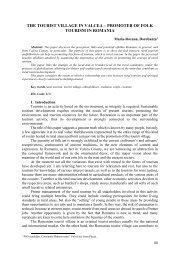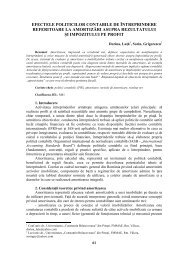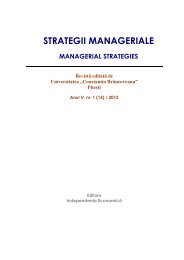equivalence versus non-equivalence in economic translation
equivalence versus non-equivalence in economic translation
equivalence versus non-equivalence in economic translation
You also want an ePaper? Increase the reach of your titles
YUMPU automatically turns print PDFs into web optimized ePapers that Google loves.
g) Differences <strong>in</strong> form – certa<strong>in</strong> suffixes and prefixes which convey prepositionaland other types of mean<strong>in</strong>g <strong>in</strong> English often have no direct equivalents <strong>in</strong> other languages.For example, the English prefix over- has the Romanian equivalent supra- <strong>in</strong> words suchas to overbid “a supralicita” (Ionescu-Cru an 2008: 214), to overburden “a suprasolicita”(ibid.: 214), to overcapitalize “a supracapitaliza” (ibid.: 214), to overvalue “a supraevalua”(ibid.: 215) etc., but there are <strong>in</strong>stances when the Romanian equivalents of the Englishterms formed by means of the prefix over- lack the correspond<strong>in</strong>g Romanian prefix: toover<strong>in</strong>vest “a <strong>in</strong>vesti excesiv” (ibid.: 214), to overlend “a împrumuta/a credita excesiv”(ibid.: 214), to overpay “a pl ti excesiv” (ibid.: 214), to overproduce “a produce excesiv”(ibid.: 214) etc. It is most important for translators to understand the contribution thataffixes make to the mean<strong>in</strong>g of words and expressions, especially s<strong>in</strong>ce they are often usedcreatively <strong>in</strong> English to co<strong>in</strong> new words for various reasons, such as fill<strong>in</strong>g temporarysemantic gaps <strong>in</strong> the language and creat<strong>in</strong>g humour.h) Differences <strong>in</strong> frequency and purpose of us<strong>in</strong>g specific forms – even when aparticular form does have a ready equivalent <strong>in</strong> the TL, there may be a difference <strong>in</strong> thefrequency with which it is used or the purpose for which it is used. English, for <strong>in</strong>stance,uses the cont<strong>in</strong>uous –<strong>in</strong>g form for b<strong>in</strong>d<strong>in</strong>g clauses much more frequently than Romanianwhich has equivalents for it: The report deals ma<strong>in</strong>ly with the buy<strong>in</strong>g habits ofhousewives. – Raportul se refer în pr<strong>in</strong>cipal la tipicul de a face cump r turicaracteristic gospod<strong>in</strong>elor. (Marcheteau, Berman and Savio 2000: 60-61); What is theestimated rise <strong>in</strong> the purchas<strong>in</strong>g power? – Cu cât se estimeaz cre terea puterii decump rare? (ibid.: 60-61).i) Loan words <strong>in</strong> the ST – are often used for their prestige value add<strong>in</strong>g an air ofsophistication to the text or its subject matter. In Romanian <strong>economic</strong> texts there are moreand more terms borrowed from English such as: management (Puiu 2001: 25), manager(ibid.: 51), leader (ibid.: 75), coach<strong>in</strong>g (ibid.: 139), mentor<strong>in</strong>g (ibid.: 139), broker (ibid.:234) etc.Accord<strong>in</strong>g to Baker (1992/2006: 26-42), professional translators should use a numberof strategies to deal with <strong>non</strong>-<strong>equivalence</strong> at the word level. Among them, she mentions:a) Translation by a more general word (superord<strong>in</strong>ate) – is used <strong>in</strong> order toovercome a relative lack of specificity <strong>in</strong> the TL compared to the SL; translators have tof<strong>in</strong>d a more general word that covers the core prepositional mean<strong>in</strong>g of the miss<strong>in</strong>ghyponym <strong>in</strong> the TL. For example, the English term liability with the specific mean<strong>in</strong>g of“legal responsibility for someth<strong>in</strong>g, especially for pay<strong>in</strong>g money that is owed, or fordamage or <strong>in</strong>jury” (Longman 2001: 812) is translated <strong>in</strong>to Romanian by means of the moregeneral terms “r spundere, obliga ie” (Turcu 1991: 387).b) Translation by a more neutral/less expressive word – is <strong>in</strong>evitable <strong>in</strong> manycases when there is not an equally expressive correspondent <strong>in</strong> the TL. For <strong>in</strong>stance, theEnglish colloquialism moonlighter “a person who does two jobs, the second usually <strong>in</strong> theeven<strong>in</strong>g” (ibid.: 574) is neutrally translated “persoan cu dou servicii” (Ionescu-Cru an2008: 191).c) Translation by cultural substitution – <strong>in</strong>volves replac<strong>in</strong>g a culture-specific itemor expression with a TL item which does not have the same propositional mean<strong>in</strong>g but islikely to have a similar impact on the TL. A Romanian term such as m<strong>in</strong>istru is translated<strong>in</strong>to English by means of an almost perfect equivalent m<strong>in</strong>ister, but problems may beencountered when translat<strong>in</strong>g the name of the Romanian function m<strong>in</strong>istru de f<strong>in</strong>an e forwhich the English equivalent is not M<strong>in</strong>ister of F<strong>in</strong>ance as one might expect; the bestoption is Chancellor of the Exchequer <strong>in</strong>dicat<strong>in</strong>g “the m<strong>in</strong>ister of f<strong>in</strong>ance <strong>in</strong> the Britishgovernment” (Webster 1996: 246).79







